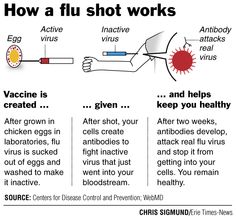5 Things You Need To Know About The Flu Shot

Flu season is among us! And with it comes the decision of whether or not to get a flu shot. Most health professionals recommend that you and your children get vaccinated as a preventative measure. But can you really get the flu from a flu shot? Does your baby need to get vaccinated? How do you know if have the flu or just a bad cold? To get answers to these questions and more, I’m separating flu fact from fiction with Dr. Danny Avula, Deputy Director of the Richmond Health District.
5 Things You Need To Know About The Flu Shot
1. The difference between the flu and a common cold.
I’ve only had the flu one time. It was on my 21st birthday. Instead of celebrating with my friends, I spent it puking in a trash can next to my bed (although the night might have ended like that anyway). I thought it was a stomach virus, then I thought it was a bad cold. By the time I realized it was the flu, I had been flat on my back for 4 days. I lived off campus and was to weak to even get to a doctor. “Some people have mild disease where it feels like a bad cold but some people get much more severe disease which is accompanied by high fever, muscle aches and pains, sore throat and it really just knocks people out for 4 or 5 days,” says Dr. Avula. Muscle aches and vomiting are clear signs that you probably have more than a cold. The best thing to do is visit your doctor to get a proper diagnosis.
2. Getting the flu shot will not give you the flu.
Before my daughter came along, I never even considered getting a flu shot—mainly because everyone says that getting the shot could give you the flu. This common misconception keeps more than a few people from getting vaccinated. According to a recent survey, 45% of respondents believe that they can get the flu from the shot. The shot is made using flu vaccine virus that have been inactivated and therefore not infectious. Some shots are made with no flu vaccine viruses at all. “But what does happen sometimes is that people who get the flu shot will have some soreness at the sight of injection and may feel a sore arm for about 24 hours. Sometimes as your immune system is responding to that vaccine and creating its protective antibodies you also may develop a little bit of a fever. So a lot of people sometimes mistake those symptoms for getting the flu after getting a flu shot,” Dr. Avula explains.
3. Everyone 6 months and older should get a flu vaccination.
About 3 years ago, the Center for Disease Control revised its recommendation to advise that everyone 6 months of age and older get a flu vaccination every year—especially those in high-risk populations. Dr. Avula agrees. “Children under 5, those over 65, pregnant women, those who have other chronic disorders—high blood pressure, diabetes, morbid obesity, some neurological diseases—all of those categories put you at much higher risk to develop severe complications from the flu. Protecting yourself against the flu could potentially save you from hospitalization, a bout with pneumonia or even death in some cases.”
4. If your child (or you) hates needles, the nasal spray is a great (and painless) option.
My daughter was elated to find out that this was available. She has done the nasal spray for the last 2 years. Naturally, I asked for it when I went to get my shot and was told I was too old to get it—which was not true! So if you are interested in receiving your vaccination this way, call to find out if your doctor offers the spray before you make your appointment. According to Dr. Avula, it’s available at most pharmacies across the country, so you could also consider that as an option. It’s important to note that although the nasal spray is made using live viruses, they are attenuated (weakened) viruses, and therefore cannot cause the flu.
5. It’s still not too late to get vaccinated.
We seem to be bombarded with information about the flu in October and November, then really don’t hear much more about it. But flu season actually starts in late October, peaks in January and can last all the way through May! Who knew?! “This is part of the reason that the CDC created National Influenza Vaccination Week—to help people realize that flu season lasts a really long time and it’s not too late to vaccinate well into December and January,” stresses Dr. Avula.
While getting the flu shot is a personal decision, it can affect your whole family and your community. “Getting the flu shot in part is about protecting ourselves, but more importantly it’s about protecting our loved ones, our community the others that might be in some of the high risk categories that I mentioned earlier. When we get the flu shot, not only are we protecting ourselves from getting the disease, but we’re protecting others who may be exposed to it if we were to get it,” says Dr. Avula. The thought of getting the flu again and passing it along to my little girl was enough to make me bite the bullet and get vaccinated. But you can bet that next year I’ll be on a hunt to get the nasal spray!
To get more information about National Influenza Vaccination Week and more flu facts, visit the Center for Disease Control.

